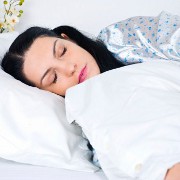 Photo: Getty Images
Photo: Getty Images
Sleep is necessary to survive. People can only go so long without sleep before suffering some severe side effects, but many don’t take sleep as seriously as they should. An awareness week is hoping to change that.
National Sleep Awareness Week is held from March 7 to 13, 2011, and its purpose is to “promote the importance of sleep,” according to the National Sleep Foundation website.
Most adults need from seven to nine hours of sleep, but most aren’t getting that. A 2005 Sleep in America poll from the NSF found that “on average, adults in America are sleeping 6.8 hours a night on weekdays and 7.4 hours a night on weekends.” Americans seem to be putting other priorities before sleep. A 2007 Sleep in America poll that focused on women found that 52 percent were unable to sleep because they ran out of time. This lack of sleep can have a toll on daily activities. The survey found that “22 percent report that sleepiness interferes with their daily activities at least a few days a week.”
Recent studies suggest how important sleep really is. People with sleep disorders know this too well. One study found that hypersomnia, “characterised by excessive tiredness during the day,” can have a negative impact on daily life for those who suffer from it. For example, they have more medical expenses and work problems (sometimes unemployment). It’s difficult to function normally when exhaustion leads to several naps a day.
Sleep deprivation and inadequate sleep is also linked to mental illness. Some studies suggest lack of sleep can be the cause of mental illness, and others suggest it’s a side effect or symptom of a mental disorder like depression. There is no question that the road to good mental health can be blocked without enough sleep.
For people who don’t necessarily have sleep disorders or mental disorders but just deprive themselves of sleep, there can also be negative side effects. For example, one study found that sleep deprivation can lead to a “higher risk of strokes and heart attacks.” Another study shows a link between inadequate sleep and colon cancer. Having adequate amounts of sleep can help with creativity, memory and even physical appearance, besides general health.
A poll will be released on the first day of the National Sleep Awareness Week with information about the link between communications technology and sleep. One question the poll looks into is how communications technology use at bedtime can impact sleep in different age groups (from ages 13 to 64).
The poll almost seems like a no-brainer. Have you ever stayed on Facebook instead of going to bed? Have you texted a crush or a friend into the wee hours of the morning out of excitement, boredom or because of insomnia? Perhaps you are a victim of this connection to technology and the sleep deprivation that ensues.
Multiple studies have come out over the years on how sleep deprivation, inadequate sleep and sleep loss can hurt health. However, not too many focus on any link between technology and sleep loss. One study from the University of Arizona does point to an interesting connection between adolescent obesity, poor sleep, caffeine and electronics.
“Results indicate that children who slept less consumed more caffeine and had more hours of screen time (use of television, Internet, computer and video games),” according to a Science Daily article. “A higher body mass index (BMI) was also associated with shorter sleep duration. More hours of screen time were also associated with higher caffeine consumption.”
A poll from The Sleep Council found that “British teenagers are damaging their health by not getting enough sleep because they are distracted by electronic gadgets in their bedrooms,” according to a Reuters article.
Although these two studies suggest an important link between sleep and electronics, the studies and polls are not necessarily stating that poor sleep is caused by electronics use. There are many factors involved in sleep loss, sleep deprivation and poor sleep in general, including genetics, diet, exercise and other lifestyle choices. Perhaps the poll released on March 7 will shed more light onto the relationship between electronics use and sleep.
Sources:
http://www.scientificamerican.com/article.cfm?id=how-long-can-humans-stay
http://www.sleepfoundation.org/article/how-sleep-works/how-much-sleep-do-we-really-need
http://www.sleepfoundation.org/article/press-release/poll-topic-2011-sleep-america-poll
http://www.sleepfoundation.org/event/national-sleep-awareness-week%C2%AE
http://www.sciencedaily.com/releases/2009/06/090609072707.htm (Internet, sleep)
http://www.reuters.com/article/2007/08/28/us-britain-sleep-idUSL2854227920070828
http://www.sciencedaily.com/releases/2010/12/101217145651.htm (hypersomnia)
http://www.sciencedaily.com/releases/2011/02/110208091426.htm (sleep deprivation and heart attacks)
http://www.sciencedaily.com/releases/2011/02/110208112741.htm (colon cancer and sleep)
http://www.sciencedaily.com/releases/2010/11/101113165441.htm (memory and sleep)
http://www.sciencedaily.com/releases/2010/12/101214201530.htm (attractiveness and sleep)
http://www.telegraph.co.uk/health/4862280/Can-sleep-deprivation-be-the-cause-of-mental-illness.html
http://www.physorg.com/news141994900.html
http://www.sleepfoundation.org/article/sleep-topics/depression-and-sleep




Add a CommentComments
There are no comments yet. Be the first one and get the conversation started!